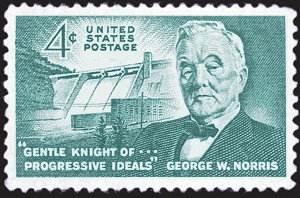 When George William Norris was 10 and had spent a hard day working on his family’s farm in northwest Ohio, his mother called him over to help plant a tree. Both of them were glistening with sweat.
When George William Norris was 10 and had spent a hard day working on his family’s farm in northwest Ohio, his mother called him over to help plant a tree. Both of them were glistening with sweat.
“Mother, why do you work so hard?,” he asked. “You won’t even see this tree in fruition.”
She looked him in the eye and said, “Willie, I may not see this tree bear fruit, but someday someone will.”
Former Nebraska lawmaker David Landis, shares that anecdote when he travels the country performing one-man shows as Sen. Norris. He said Norris, the great leader from his state in the first half of the 20th century, used that story throughout his life to get people thinking of the future. “Our legacy,” Landis — as Norris — would say, “runs across generations, and the shadow of our life falls upon generations yet unborn.”
 The generations of rural Americans, beginning with the baby boomers, who grew up enjoying the benefits of modern, electrical living owe much to Sen. Norris. The valiant and persistent struggles he waged to pass the Rural Electrification Act 75 years ago, and the Tennessee Valley Authority Act three years before that, continue casting not shadows in this case but a glow. Even though Norris, who died in 1944, lived barely beyond their infancy, his legacy is one of power and light for rural America.
The generations of rural Americans, beginning with the baby boomers, who grew up enjoying the benefits of modern, electrical living owe much to Sen. Norris. The valiant and persistent struggles he waged to pass the Rural Electrification Act 75 years ago, and the Tennessee Valley Authority Act three years before that, continue casting not shadows in this case but a glow. Even though Norris, who died in 1944, lived barely beyond their infancy, his legacy is one of power and light for rural America.
Norris was born July 11, 1861, four months after Abraham Lincoln took the oath as president. On his 150th birthday this month, it’s important his legislative legacy and his courage to stand with his conscience and not the convenience of his political party are not forgotten.
Norris spent most of his life as a Republican, proud to follow in the footsteps of Lincoln. And, like Lincoln, he, too, has Hoosier roots, though not nearly so deep. Norris received his law degree in 1883 from what was then called the Northern Indiana Normal School and Business Institute. Today it’s Valparaiso University.
By the time he’d served in the U.S. Senate during the Harding, Coolidge and then Hoover administrations, he expressed incredulity that the party of Lincoln had turned its back on the common man and become the party of Hoover in just 60 years.
In the 1920s, Norris successfully blocked the sale of a federal hydroelectric dam in Alabama to industry titans Henry Ford and Thomas Edison. Norris realized the potential of such dams to provide electricity, stem flooding in spring, provide irrigation during summer and spur economic development. In 1928 and 1931, he pushed through Congress legislation providing for government operation of such facilities. Presidents Calvin Coolidge and Herbert Hoover vetoed the bills.
In the 1932 presidential election, the Republican threw his support to Democrat Franklin D. Roosevelt because he saw no one else supporting the interests of farmers and other rural residents. In 1933, his Tennessee Valley Authority Act was passed and signed into law by the new Democratic president.
Roosevelt is most often seen as the father of the REA, but it took cooperation across the aisle to get the act passed in 1936. That cooperation came from Norris, who Roosevelt called “the very perfect gentle knight of American progressive ideals.” Norris authored and co-sponsored the Rural Electrification Act.
For Norris, the TVA and REA did more than bring affordable electricity to the 90 percent of American farms that didn’t have it available. Electricity raised the standard of living for rural people and gave hope to millions of farm families.
Norris proved to be a statesman first. As a senator, John F. Kennedy included Norris in his Pulitzer Prize-winning book, “Profiles in Courage.” Kennedy wrote: “For democracy means much more than popular government and majority rule, much more than a system of political techniques to flatter or deceive powerful blocs of voters. A democracy that has no George Norris to point to — no monument of individual conscience in a sea of popular rule — is not worthy to bear the name.”
On the editorial page of this publication 50 years ago, marking the centennial of Norris, Sen. George D. Aiken wrote of Norris: “The memory of George Norris should serve to remind us that the challenge today is as urgent as it was in his day.
“The United States needs strong leadership today to carry on the battle to develop our natural resources for the benefit of all, and not just for the profit of a few.”
The consistent character of caring and courage, imprinted on him by his hard-working widowed mother, was exhibited by Norris throughout his life. Those values remained a true measure of what a leader needed to be then and what our leaders need to be still today.



